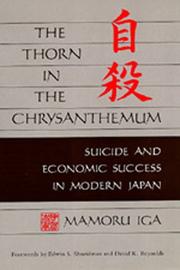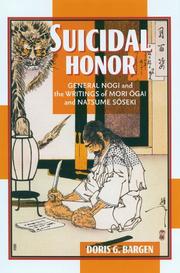| Listing 1 - 4 of 4 |
Sort by
|
Book
ISBN: 2070701891 9782070701896 Year: 1985 Publisher: Paris Gallimard
Abstract | Keywords | Export | Availability | Bookmark
 Loading...
Loading...Choose an application
- Reference Manager
- EndNote
- RefWorks (Direct export to RefWorks)
Suicide --- History --- J4234 --- -Killing oneself --- Self-killing --- Death --- Right to die --- Japan: Sociology and anthropology -- social pathology -- suicide --- Causes --- -Japan: Sociology and anthropology -- social pathology -- suicide --- Killing oneself --- History. --- Suicide - Japan - History

ISBN: 0520056485 Year: 1986 Publisher: Berkeley University of California press
Abstract | Keywords | Export | Availability | Bookmark
 Loading...
Loading...Choose an application
- Reference Manager
- EndNote
- RefWorks (Direct export to RefWorks)
Social structure --- Social values --- Success in business --- Suicide --- J4234 --- Values --- Japan: Sociology and anthropology -- social pathology -- suicide --- Social problems --- Japan --- Social values.
Book
ISBN: 0691067740 1322020159 1400861004 0691607834 0691636354 9781400861002 9780691607832 Year: 2014 Volume: vol *8 Publisher: Princeton, NJ
Abstract | Keywords | Export | Availability | Bookmark
 Loading...
Loading...Choose an application
- Reference Manager
- EndNote
- RefWorks (Direct export to RefWorks)
Dazai Osamu (1909-1948) is one of Japan's most famous literary suicides, known as the earliest postwar manifestation of the genuinely alienated writer in Japan. In this first deconstructive reading of a modern Japanese novelist, Alan Wolfe draws on contemporary Western literary and cultural theories and on a knowledge of Dazai's work in the context of Japanese literary history to provide a fresh view of major texts by this important literary figure. In the process, Wolfe revises Japanese as well as Western scholarship on Dazai and discovers new connections among suicide, autobiography, alienation, and modernization. As shown here, Dazai's writings resist narrative and historical closure; while he may be said to serve the Japanese literary establishment as both romantic decadent and representative scapegoat, his texts reveal a deconstructive edge through which his posthumous status as a monument of negativity is already perceived and undone. Wolfe maintains that cultural modernization pits a Western concept of the individual as realized self and coherent subject against an Eastern absent self--and that a felt need to overcome this tension inspires the autobiographical fiction so prevalent in Japanese novels. Suicidal Narrative in Modern Japan shows that Dazai's texts also resist readings that would resolve the gaps (East/West, self/other, modern/premodern) still prevalent in Japanese intellectual life.Originally published in 1990.The Princeton Legacy Library uses the latest print-on-demand technology to again make available previously out-of-print books from the distinguished backlist of Princeton University Press. These editions preserve the original texts of these important books while presenting them in durable paperback and hardcover editions. The goal of the Princeton Legacy Library is to vastly increase access to the rich scholarly heritage found in the thousands of books published by Princeton University Press since its founding in 1905.
Suicide dans la littérature --- Suicide in literature --- Zelfmoord in de literatuur --- Suicide in literature. --- Dazai, Osamu, --- Tsushima, Shūji, --- 太宰治, --- Criticism and interpretation. --- Dazai, Osamu --- Criticism and interpretation --- J5931 --- J4234 --- Japan: Literature -- modern fiction and prose (1868- ) -- criticism --- Japan: Sociology and anthropology -- social pathology -- suicide --- 다자이, 오사무 --- 太宰治 --- Dazai Osamu

ISBN: 9780824829988 0824864514 1435665996 9780824864514 9781435665996 0824829980 Year: 2006 Publisher: Honolulu
Abstract | Keywords | Export | Availability | Bookmark
 Loading...
Loading...Choose an application
- Reference Manager
- EndNote
- RefWorks (Direct export to RefWorks)
"On September 13, 1912, the day of Emperor Meiji's funeral, General Nogi Maresuke committed ritual suicide by seppuku (disembowelment). It was an act of delayed atonement that paid a debt of honor incurred thirty-five years earlier. The revered military hero's wife joined in his act of junshi ("following one's lord into death"). The violence of their double suicide shocked the nation. What had impelled the general and his wife, on the threshold of a new era, to resort so drastically, so dramatically, to this forbidden, anachronistic practice? The nation was divided. There were those who saw the suicides as a heroic affirmation of the samurai code; others found them a cause for embarrassment, a sign that Japan had not yet crossed the cultural line separating tradition from modernity.While acknowledging the nation's sharply divided reaction to the Nogis' junshi as a useful indicator of the event's seismic impact on Japanese culture, Doris G. Bargen in the first half of her book demonstrates that the deeper significance of Nogi's action must be sought in his personal history, enmeshed as it was in the tumultuous politics of the Meiji period. Suicidal Honor traces Nogi's military career (and personal travail) through the armed struggles of the collapsing shôgunate and through the two wars of imperial conquest during which Nogi played a significant role: the Sino-Japanese War (1894-1895) and the Russo-Japanese War (1904-1905). It also probes beneath the political to explore the religious origins of ritual self-sacrifice in cultures as different as ancient Rome and today's Nigeria. Seen in this context, Nogi's death was homage to the divine emperor. But what was the significance of Nogi's waiting thirty-five years before he offered himself as a human sacrifice to a dead rather than living deity? To answer this question, Bargen delves deeply and with great insight into the story of Nogi's conflicted career as a military hero who longed to be a peaceful man of letters. In the second half of Suicidal Honor Bargen turns to the extraordinary influence of the Nogis' deaths on two of Japan's greatest writers, Mori Ôgai and Natsume Sôseki. Ôgai's historical fiction, written in the immediate aftermath of his friend's junshi, is a profound meditation on the significance of ritual suicide in a time of historical transition. Stories such as "The Sakai Incident" ("Sakai jiken") appear in a new light and with greatly enhanced resonance in Bargen's interpretation. In Sôseki's masterpiece, Kokoro, Sensei, the protagonist, refers to the emperor's death and his general's junshi before taking his own life. Scholars routinely mention these references, but Bargen demonstrates convincingly the uncanny ways in which Sôseki's agonized response to Nogi's suicide structures the entire novel. By exploring the historical and literary legacies of Nogi, Ôgai, and Sôseki from an interdisciplinary perspective, Suicidal Honor illuminates Japan's prolonged and painful transition from the idealized heroic world of samurai culture to the mundane anxieties of modernity. It is a study that will fascinate specialists in the fields of Japanese literature, history, and religion, and anyone seeking a deeper understanding of Japan's warrior culture." -- Publisher's description.
J2284.70 --- J5931 --- J5009 --- J4121 --- J4234 --- Japan: Genealogy and biography -- biographies -- kindai (1850s- ), bakumatsu, meiji, taishō --- Japan: Literature -- modern fiction and prose (1868- ) -- criticism --- Japan: Language -- theory, methodology and philosophy --- Japan: Sociology and anthropology -- leadership and loyalty --- Japan: Sociology and anthropology -- social pathology -- suicide --- Japanese literature --- Suicide in literature. --- Seppuku. --- Hara-kiri --- Harakiri --- Suicide --- History and criticism. --- Natsume, Sōseki, --- Mori, Ōgai, --- Nogi, Maresuke, --- Nogi, Kiten, --- 乃木希典, --- Mori, Rintarō, --- Ōgai, Mori, --- Ōgai Gyoshi, --- 森鷗外, --- 森〓外, --- 森鸥外, --- 森林太郎, --- 鷗外漁史, --- Natsume, Kinnosuke --- Sōseki, Natsume --- Sōseki --- Hsia-mu, Shu-shih --- Xiamu, Shushi --- 夏目, 漱石 --- 夏目, 金之助 --- Criticism and interpretation. --- In literature.
| Listing 1 - 4 of 4 |
Sort by
|

 Search
Search Feedback
Feedback About UniCat
About UniCat  Help
Help News
News